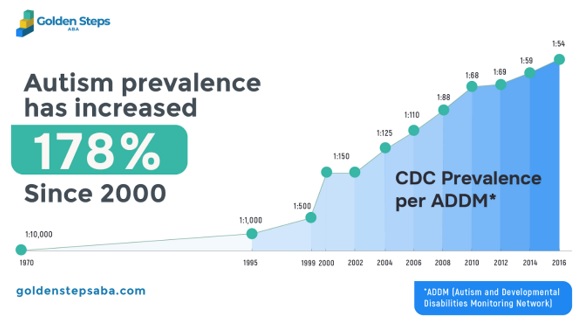Everything You Need To Know About Rejection Sensitive Dysphoria Symptoms Within Children With Autism
12th January 2024

Children with autism always find it difficult to interact socially, form proper sentences to communicate, be sensitive to sensory objects, behavioural problems, and in every aspect of life. Autism which is also called Autism Spectrum Disorder (ASD) is a neurodevelopmental disorder and it’s often referred to as a “spectrum” disorder because the symptoms and severity can vary from individual to individual.
According to goldenstepsaba.com, the autism prevalence rate has increased by 178% since 2000, which is a concerning fact that parents and special needs teachers should be aware of.

Source: goldenstepsaba.com
In most cases, it’s found that those children who have autism may also experience Rejection Sensitive Dysphoria (RSD) symptoms which simply means that they show intense emotional responses to any kind of criticism and rejection in their life.
In this blog post, we will be exploring, the possible signs and symptoms of RSD in children with autism that every special needs teacher and parent should identify to provide the necessary support and guidance.
Before moving to the topic, can we ask you a question? Do you follow us on Social Media? We regularly share upgraded educational content, tips, feedback, and more. Check us out by clicking the profiles here - Facebook / Twitter / LinkedIn / Pinterest / Instagram / YouTube
So, without any further delay, let’s get started.
Signs and Symptoms of Children With Autism Having Rejection Sensitive Dysphoria (RSD)
As responsible special needs teachers and parents you must be able to identify the signs of Sensitive Dysphoria (RSD) in children with autism to provide them the required support.
Below we have shared various signs that will ensure that children with autism have Rejection Sensitive Dysphoria (RSD) symptoms as well.
Fear of Rejection in Society
One of the primary signs that children or teens with autism may exhibit is that they have an intense fear of not getting accepted by society which leads them to avoid any social interaction, initiate any conversion, or maintain any relationship if they make any. They constantly overthink and worry that they will get excluded and criticized by society or a group of their peer.
Over-react To Certain Situations
In general, children with autism often have the tendency to react emotionally and the addition of Rejection Sensitive Dysphoria (RSD) symptoms intensifies it. You can often find that they overreact to situations where they are being criticized, getting rejected, or facing any failure in their life because they feel an extensive amount of shame, anxiety, and emotional pain from this kind of situation.
Difficulty in Regulating Their Emotions
You can always find that children or teens with autism often struggle to regulate their emotions in any social situation which gets intensified even further with Rejection Sensitive Dysphoria (RSD) symptoms. Most of the time they often experience mood swings, depression, and anxiety which makes it difficult for them to regulate their emotions during any social interaction.
Anxious In Social Situation
Children or teens with autism and Rejection Sensitive Dysphoria (RSD) symptoms always feel uncomfortable during social interaction which makes them anxious. They always find themselves as nervous and anxious which makes it difficult to initiate any conversation or to maintain nay relationship.
Benefits of mixed-age groupings
Strive For Perfection
Children with autism and Rejection Sensitive Dysphoria (RSD) symptoms have a belief that they can only avoid rejection, criticism, or failure in their lives if they become perfect. You always find them to set high standards in every aspect of their life.
Issue With Their Self-Esteem
Children with autism and Rejection Sensitive Dysphoria (RSD) symptoms always have issues with their self-esteem and self-worth. They always feel inferior to others and often have self-doubt that they might get rejected and the feeling of emotional distress because of it.
Additionally, you can also find that they always seek validation from others as well.
Helpful Strategies To Manage RSD Symptoms Within Children With Autism
Now we know what signs and symptoms are there you should be able to recognize that your children with autism also have Rejection Sensitive Dysphoria (RSD) symptoms. Let’s get to know some of the helpful strategies with which you can provide the required support to children with autism and Rejection Sensitive Dysphoria (RSD) symptoms.
Identify Triggers
By observing and identifying which certain people, situations, or events trigger the symptoms of Rejection Sensitive Dysphoria (RSD) symptoms within children with autism can help you to make effective strategies for them so that they can manage their emotional responses. This strategy will help children with autism and RSD to mitigate the effects of these triggers and improve their overall emotional well-being.
Help Them To Become Self-Aware
Self-awareness can prove to be one of the essential steps for children with autism and Rejection Sensitive Dysphoria (RSD) symptoms to understand their thought processes. You can encourage them to journal their thoughts or share any rejection or criticism-related experiences with any adult figure with whom they are comfortable. This will help them to understand how Rejection Sensitive Dysphoria (RSD) symptoms are impacting their life and how they can overcome them successfully.
Help Them To Cope-up With Situations
You can come up with certain strategies to cope up with the symptoms related to Rejection Sensitive Dysphoria (RSD) for children with autism. You can encourage them to involve in certain activities like- simple breathing or deep breathing, mindfulness, and muscle relaxation activities can help them taking care of their emotions properly and bring down their emotional stress level while facing any social situation.
Engage Them With Self-Care Activities
Practicing any kind of self-care activities can help reduce the stress and anxiety level in children with autism and symptoms of Rejection Sensitive Dysphoria (RSD). You can encourage them practice activities like- exercise, maintain a healthy diet, sleep for adequate timing and be involved with any creative hobbies that will make themselves relaxed and give them joy.
Encourage Them To Practice Positive Self-Talk
Positive inner self-talk is perhaps the most useful tool that should introduce to the children with autism and Rejection Sensitive Dysphoria (RSD) symptoms.
It will help them to have control over the negative thoughts that will come up in their minds as well as emotions. You can encourage them to reframe any of their negative thoughts into positive ones when they have one, and with practice, they will be able to manage their emotional responses to foster a positive mindset.
Encourage Them To Seek Social Support
Lastly, as responsible special needs teachers and parents you must consider creating a comfortable environment where children with autism Rejection Sensitive Dysphoria (RSD) symptoms can share their experiences related to any social situation without any fear of judgment. Additionally, make sure to give them valuable guidance and support which will help them to navigate any challenging social situations in life.
Become Aware of Rejection Sensitive Dysphoria (RSD) Within Autistic Children To Support Them Better
In general, children with autism always have a hard time communicating, navigating any social interactions, and facing criticism, rejection, and failure which could get aggravated with the presence of Rejection Sensitive Dysphoria (RSD) symptoms. Those Special needs Teachers and even parents who have pursued courses like Master of Arts in Education with Special Education, know how to identify the signs of Rejection Sensitive Dysphoria (RSD) symptoms within children with autism and how to provide them the necessary support.
However, in this blog post as well, we have shared various easy-to-identify signs and symptoms of Rejection Sensitive Dysphoria (RSD) symptoms within children with autism and with that, we also shared helpful strategies to cope with any challenging social situations. So, help your children with autism to deal with Rejection Sensitive Dysphoria (RSD) symptoms and face any rejections, failure and criticism in their life with confidence.
We believe education should be accessible for everyone. That’s why we don’t charge for our blogs. Find the right course that will help you in your career with us, contact us at - 1800–212–6400. You can mail us at act@asiancollegeofteachers.com.












